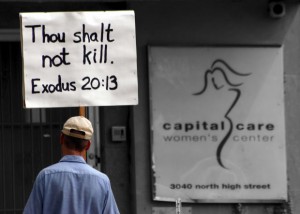 WASHINGTON — The U.S. Supreme Court is set to hear oral argument on Wednesday surrounding a Massachusetts law that prohibits pro-life sidewalk counselors from coming within 35 feet of the entrance or driveway of abortion facilities.
WASHINGTON — The U.S. Supreme Court is set to hear oral argument on Wednesday surrounding a Massachusetts law that prohibits pro-life sidewalk counselors from coming within 35 feet of the entrance or driveway of abortion facilities.
The case before the court, McCullen v. Coakley, began in 2008 and was filed on behalf of seven pro-life residents—mostly Catholic—that regularly engage in sidewalk counseling outside of abortion facilities in the state. U.S. District Judge Joseph Tauro initially upheld the ordinance, stating that the requirement did not hinder free speech.
“From the evidence,” he wrote in his decision, “it is clear that the Act, as applied at each of the challenged [locations] leaves open ample adequate alternative means of communication.”
The First Circuit Court of Appeals agreed, finding no constitutional infringement inherent in the regulation.
“The Massachusetts statute at issue here is a content-neutral, narrowly tailored time-place-manner regulation that protects the rights of prospective patients and clinic employees without offending the First Amendment rights of others,” the three-judge panel wrote. “The nation is sharply divided about the morality of the practice [of abortion] and its place in a caring society. But the right of the state to take reasonable steps to ensure the safe passage of persons wishing to enter health care facilities cannot seriously be questioned.”
Therefore, the case was then appealed to the Supreme Court, which agreed to hear the challenge last June.
State Attorney General Martha Coakley told The Republican this week that she believes the law is reasonable as it applies to everyone and reflects similar buffer zones in other venues.
“For protests, funerals, political events, indeed for voting, the courts have upheld appropriate buffer zones in instances where the states have made a careful effort to do this balance, as we have here,” she stated. “We believe that in striking the appropriate balance, given the history in Massachusetts of violence and harassment, and understanding the important First Amendment constitutional issue, the (law) deals with the public safety issue and allows for First Amendment rights.”
But Mark Reinzi, who represents the seven plaintiffs says that there has not been violence at a Massachusetts abortion facility since 1994, and that those intent on committing violence would not be stopped by the law. The plaintiffs in the case are non-violent and seek to distribute literature and speak with women entering the abortion facilities.
“The idea that someone like that will be deterred by a painted line on the ground is nonsensical,” he told the Associated Press. “In the meantime, you shouldn’t be able to use that to stop women from being offered these other options. As a practical matter, that’s what happens.”
The law was first passed in 2000 as a 18-foot floating buffer zone, and was later amended as a fixed 35-foot buffer zone.
The case, while centered on a Massachusetts law, may affect the rights of pro-life sidewalk counselors across the country.
Become a Christian News Network Supporter...


